Sharing good practices and learnings on localisation – workshop hosted by Shifting the Power project and the CHS Alliance
On 13 March 2018, Shifting the Power (StP) and the CHS Alliance gathered together 55 humanitarian actors representing local and national NGOs, INGOs, UN agencies and International Committee of the Red Cross in 13 countries to present and discuss the key findings of StP’s end of project evaluation. The workshop was specifically intended to share evidence of good practice and learnings on strengthening capacities, voice and influence of local and national organisations and to generate recommendations on how to sustain and build on the results of the project.
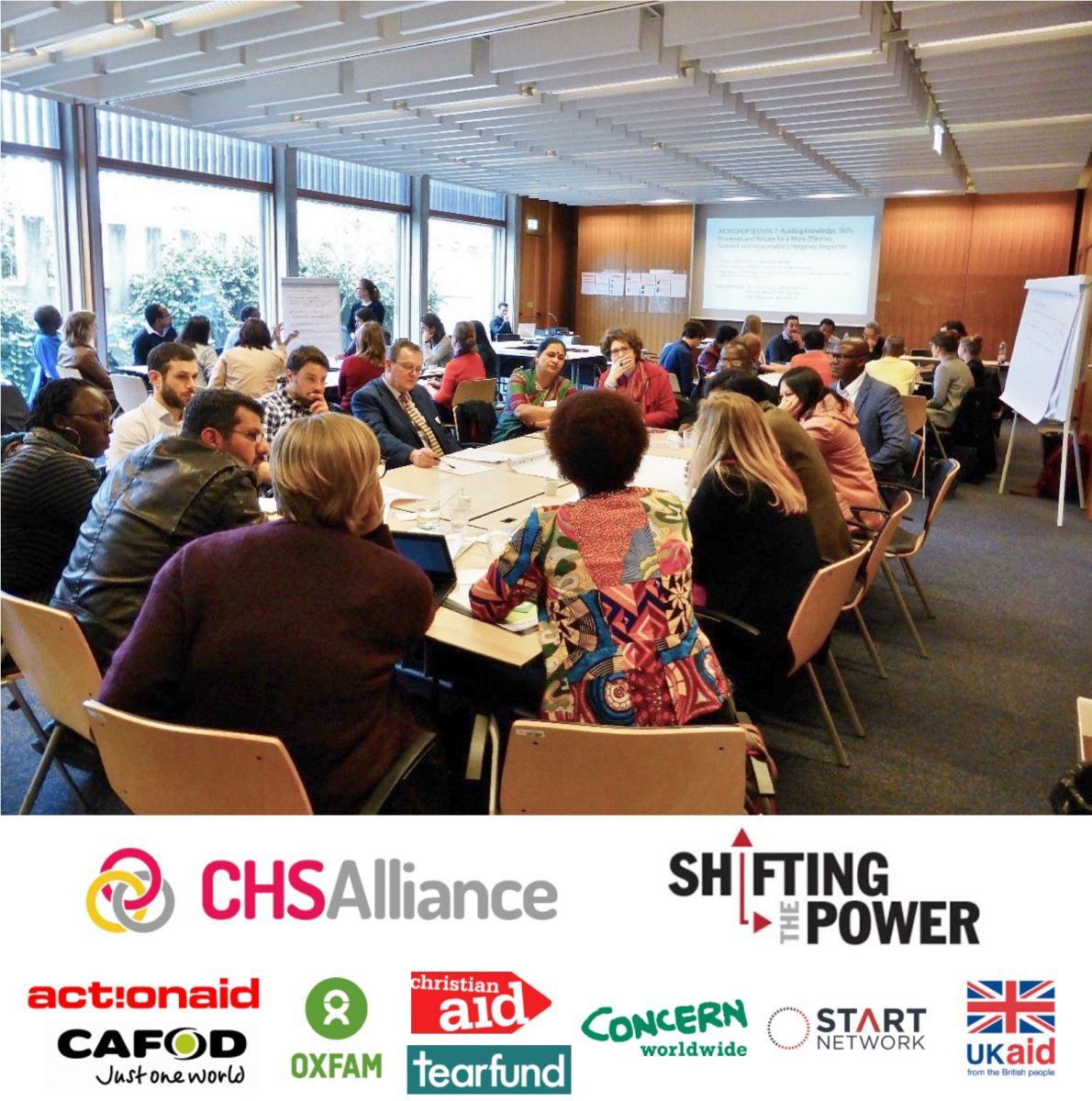
Three speakers gave the opening remarks: Bob Ruxton, Chair of StP’s International Steering Committee and Head of International Support for Concern Worldwide UK; Judith Greenwood, Executive Director of CHS Alliance and Ahmed Abdi, Executive Director of Arid Lands Development Foundation from Wajir, Kenya. Bob highlighted how StP has offered promising signs of altering the current power dynamics in the humanitarian system, with L/NNGOs challenging directly the role of INGOs and announcing when their help is needed and when it is not. He said: “The journey of the project will continue in a different guise, taking forward some of the lessons of the project, while also ensuring that the project design is locally owned and fully inclusive, engaging women and communities.“
Judith noted that StP’s theory of change speaks directly to CHS Commitment Number 7 – humanitarian actors continuously learn and improve – and affirmed that all humanitarian agencies, whether local and national ones or large international ones, should put people affected by crises at the heart of their activities and response. “As the recent crises regarding safeguarding and sexual exploitation showed, accountability needs to be embedded in organizational leadership and its culture at all levels. We need to lead by example: accountability to communities affected by humanitarian crises is something that organisations’ leader should abide by”, she noted.
Ahmed narrated the journey of his organization, which started as a community-based group about twenty years ago, mainly active in the field of food security, and began partnering with INGOs over the past ten years, fitting the mold of what international agencies require of local partners. ALDEF also has worked with the government in the last decade and now sees its future as working with the community. Ahmed illustrated some of the results that ALDEF reached by joining the Shifting the Power project: the capacity self-assessment process led to improvement in the organization; formation and training of the Emergency Response Team and, developing emergency response proposals and obtaining funding for these. “One of the most important process that ALDEF started, together with StP, was the development of a community-based disaster management framework where women’s groups influenced the Wajir county government to review the disaster management policy and the framework and make it more responsive to their needs.”
End of Project Evaluation – Presentation of key findings
- Glenn O’Neill, Independent consultant and team leader of the evaluation
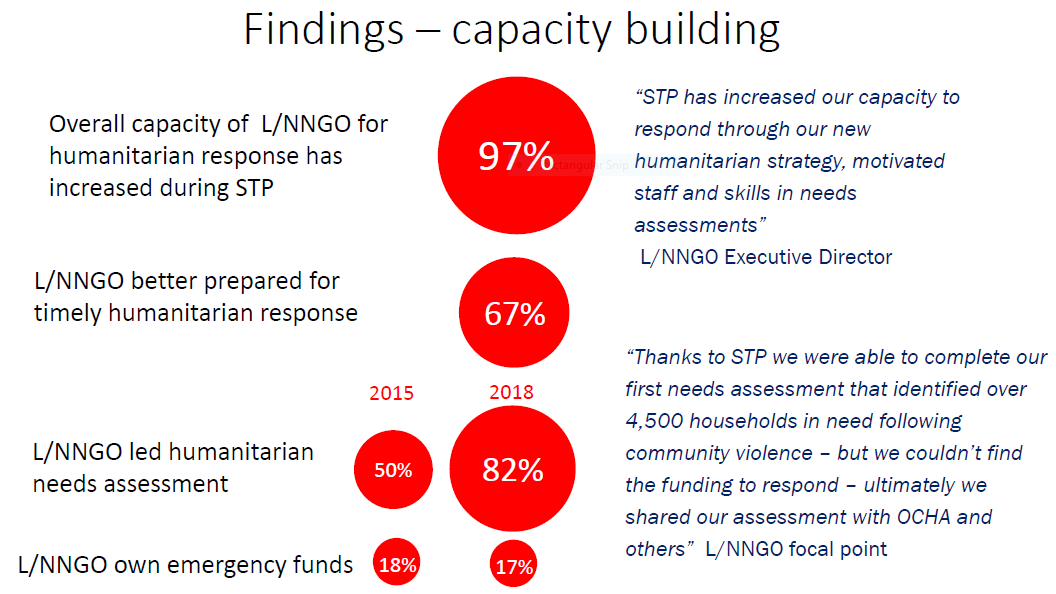
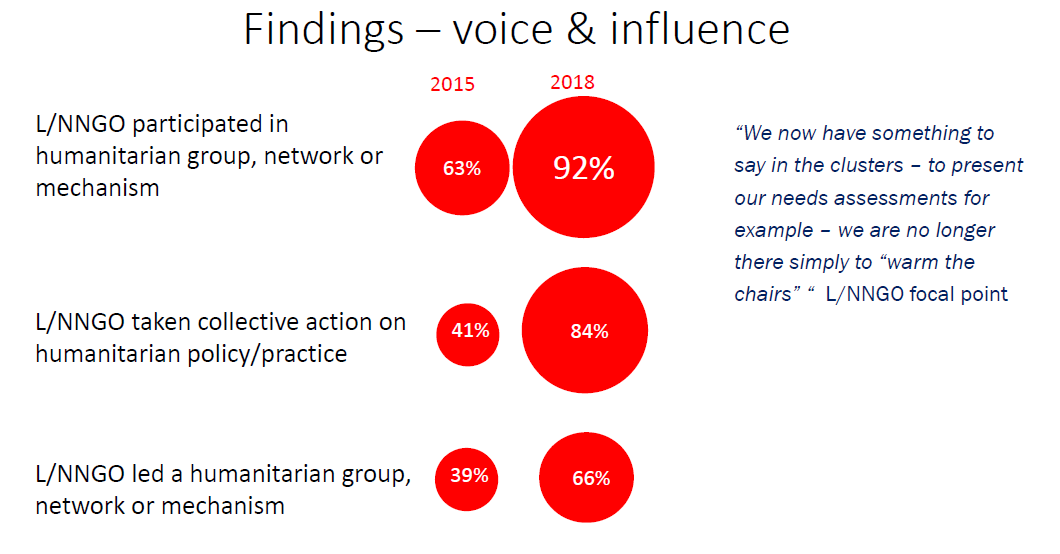
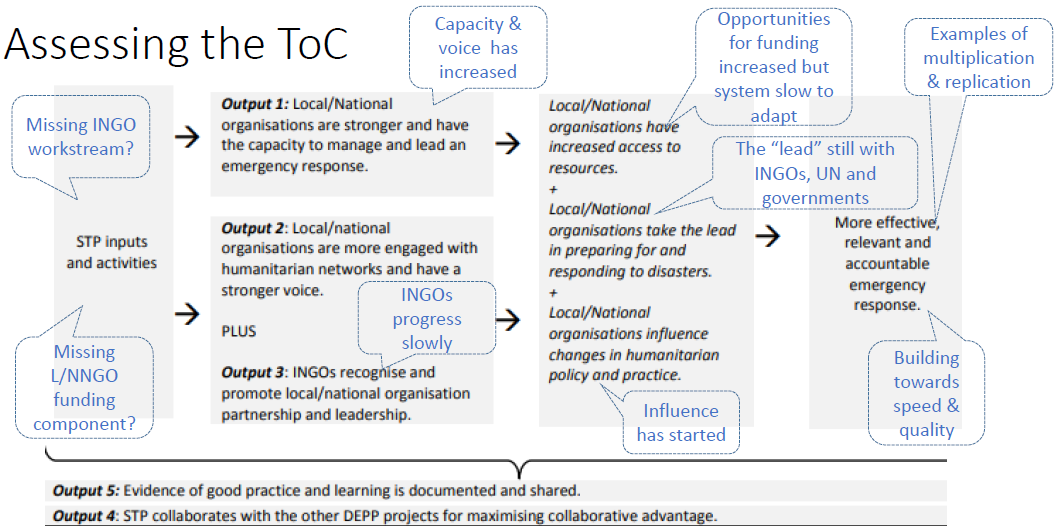
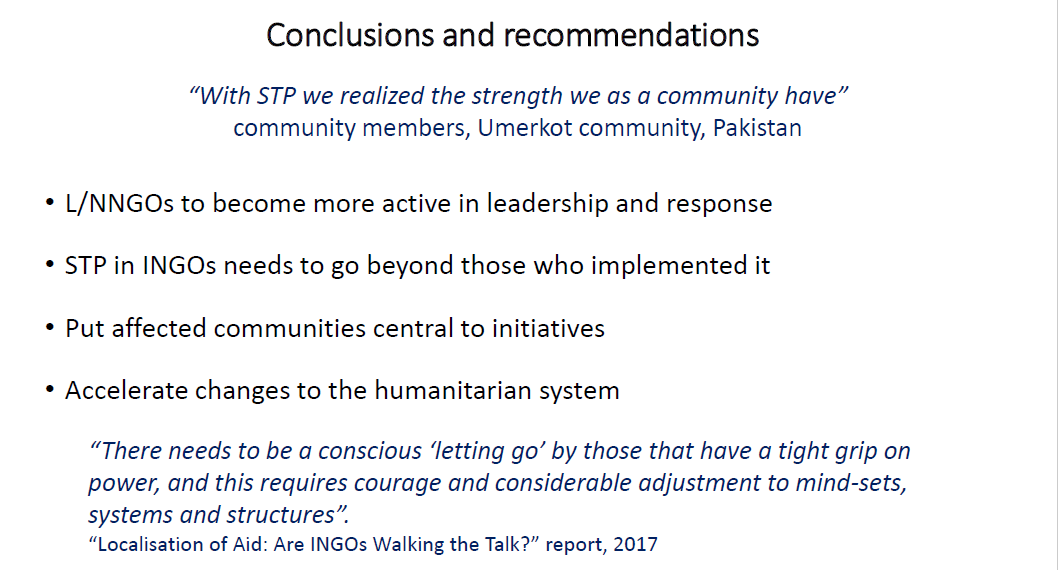
Session 1: Improving representation and voice of local and national actors in humanitarian networks and platforms
Panelists:
- Jeremy Wellard – Regional Representative for Asia, ICVA
- Mohammed Amad – Chairperson, National Humanitarian Network (NHN), Pakistan
- Augustin Karume – Representative, CCONAT, DRC
The partnership between the three different humanitarian NGO networks in DRC allowed L/NNGOs to speak with one voice and approach government authorities, bilateral donors and the UN with more impact. A key target of their advocacy was the Congolese Ministry of Humanitarian and Social Affairs, with whom there are ongoing discussions on the need to establish a humanitarian budget.
The National Humanitarian Network in Pakistan has witnessed its position of influence growing since its establishment in 2010. The NHN holds a seat at the Humanitarian Country Team and at the Pooled Fund advisory board, and a partner of START Network, the Charter4Change and the DEPP. All these efforts have been made in order to prove the existing local humanitarian capacity and ensure a more balanced humanitarian system. NHN has worked for example through locally owned surge rosters and drawing up a Charter of Commitment with STP’s consortium INGOs in order to monitor their delivery against the localization objectives. For NHN the localization debate goes beyond the funding question, it is about putting disaster-affected communities at the centre of the response.
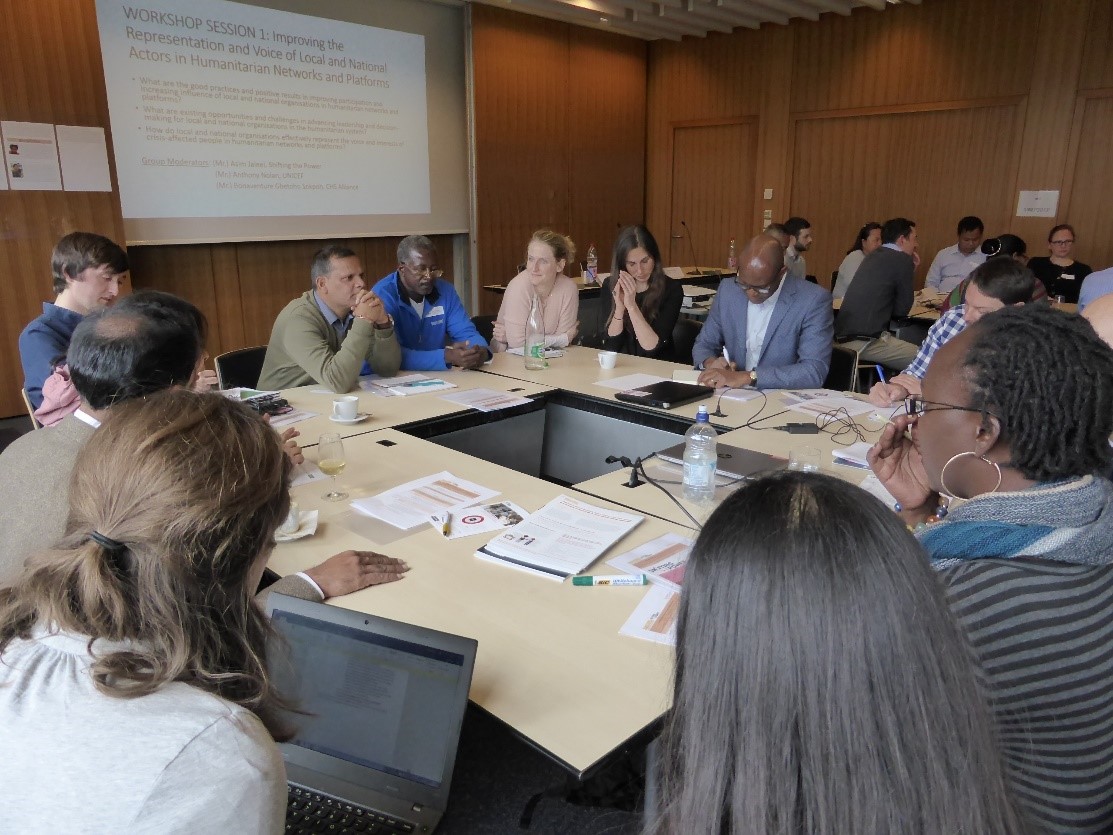
Other lessons from StP in particular on working with established/newly-formed humanitarian networks:
- International organisations need to work on two levels, one is strategic and related to global policies and the second one is operational. For the first aspect, international actors need to open up space in the HCT, while operationally they also have to nurture local leadership, as several initiatives in Pakistan and the Philippines have done, and make space for these leaders.
- Networks have a replicating effect. NGOs partnership networks should advocate to merge different capacity building initiatives and avoid duplication, for example by launching a unified partners capacity assessment.
- The Less Paper More Aid was mentioned as good practice that can be scaled up.
Some of the challenges and opportunities identified in advancing leadership and decision making for local and national organisations in the humanitarian system:
- L/NNGOs lack dedicated staff for advocacy and networking functions.
- National government embedding national NGO networks in the official coordination mechanisms (Pakistan and Bangladesh).
- Long-term capacity building and organisational development provisions as part of partnership agreements between international and local agencies.
- Local and National NGOs can show their leadership in carrying out multi-sector needs assessment, performing humanitarian advocacy and delivering services and planning; all of which would contribute to their reaching a leadership position and steer the decision-making.
Session 2: Building knowledge, skills, processes and policies for a more effective, relevant and accountable response
Presenters:
- Coree Steadman, StP International Project Manager
- Daniel Gebremedhin, StP Project Manager in Ethiopia
- Berhanu Geleto, Exec. Director, Rift Valley Children and Women Development Organisation
Humanitarian Capacity Self-assessment and the SHAPE Framework
 STP’s understanding of humanitarian capacity captures all key aspects of designing, delivering and determining humanitarian response, including leadership, influence and emergency preparedness and response. We have developed the SHAPE framework to support local organisations to analyse their strengths and gaps in managing and influencing humanitarian response.
STP’s understanding of humanitarian capacity captures all key aspects of designing, delivering and determining humanitarian response, including leadership, influence and emergency preparedness and response. We have developed the SHAPE framework to support local organisations to analyse their strengths and gaps in managing and influencing humanitarian response.
The framework is designed to be flexible in order to be applicable to a diverse range of organisations and emergency contexts. The framework is summarised in the SHAPE Diagram on the right:
It builds on the Core Humanitarian Standards and was based on CAFOD Humanitarian Capacity Assessment FrameworkEach StP Consortium Member took the lead on facilitating the self-assessment with their partners, building on an existing relationship of trust, mutual understanding and strategic alignment. Alternative capacity building approaches were introduced and local organisation’s understanding of these were strengthened. These include ongoing accompaniment, self-assessment, emergency simulations, workshops, leadership development, technical support visits, e-learning, coaching, peer review and exchange and on the job training. The self-assessment using the SHAPE framework provided the baseline information of local organisation’s competencies and was used to establish milestones and develop their Capacity Strengthening Plans.
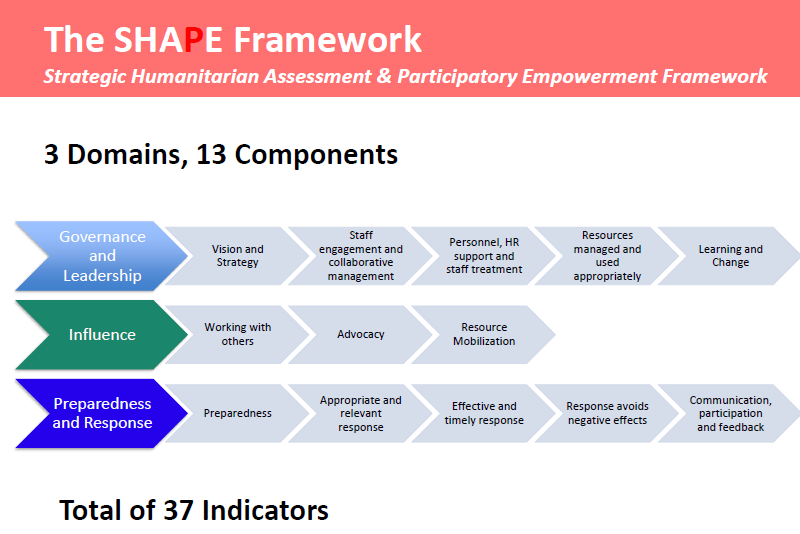
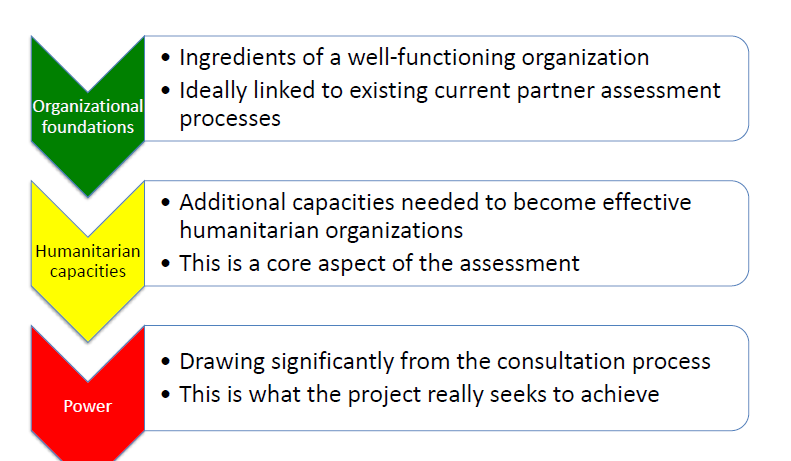
Capacity Strengthening Journey – Ethiopia Experience
The 10 Ethiopian L/NNGO partners prioritised improving organisational preparedness and their resource mobilisation capacity. L/NNGO staff attended training on CHS Core Humanitarian Standards, Humanitarian Code of Conduct, LEGS, SPHERE, rapid needs assessment and the national DRR policy, among others, while consortium INGOs provided technical advice and mentoring throughout. The Ethiopian NGO partners revised their organizational policies – financial, HR, procurement and logistics- to respond to humanitarian situations with speed and quality, for example by forming Emergency Response Teams. Once these foundations were in place, StP partners developed a fundraising strategy, developing an opportunity logbook, conducting donor mapping and understanding the prequalified requirements of donor organizations.
Berhanu Geleto offered further insight on how the capacity building exercise through SHAPE worked for a national organization. For RCWDO, the evaluation of organizational competencies through the tool allowed it to embed the humanitarian response functions within the organization. Management and front-line staff in the Emergency Response Team agreed on the way forward for the organization to respond to emergencies more effectively. The NGO revisited its systems and procedures from a humanitarian response point of view: it aligned its HR policies for deployment, the financial systems and its procurement practices, as well as organizational communication practices.
Besides attending the training that STP offered, RCWDO spent time to build networks with other agencies, participating for example in the multi-agency needs assessments. Berhanu said that SHAPE can be used as a tailor-made tool for national NGOs, but it needs to be contextualized to their needs and environment. Through the SHAPE framework, he continued, RCWDO also prioritized engagement with affected people in the process, for example by setting up an accountability and complaint mechanisms during a drought response project for pastoral communities. Berhanu concluded by saying that the framework motivated his organization to perform effectively in humanitarian response.
Some reflections from the breakout sessions are as follows:
- A humanitarian capacity building framework for local partners should hinge on knowledge management and mentoring, in particular looking at fundraising and resource mobilization. It should be tailored to the end users/clients, which can be communities, NGOs and the government.
- Communities (must be) integral to all decision-making; integrated throughout the programme cycle, from assessing needs and planning to the implementation. It is about ownership, dignity. Accountability is putting people at the centre by operationalising complaints and feedback mechanisms for instance. It is also about transparency of processes and decisions.
- What local organisations can do better and differently? Door to door approaches, making list of beneficiaries public, giving time to people to give feedback, redress mechanisms in case of illegitimate exclusion, build on what the community has at its core, but also learnt that they exposure to new things is limited.
- How do L/NNGOs put disaster-affected people at the centre of humanitarian action?
- The working style and approach of humanitarian NGOs should focus more on community leadership and less on the need for NGO visibility.
- Link with the government to ensure sustainability. Work with communities to make sure they understand power dynamics and develop strategies to influence.
- INGOs need to change the way we work: move away from donor visibility requirements.
- Individual leadership is essential to driving institutions – leaders need to be honest, and donors have to be accountable to the process.
- Institutional preparedness is key, not just proximity to affected people.
- Disagrees with the question. In disaster, we are running against time. To keep people at the centre, we need a long- term relationship, which we don’t usually have.
- Invest more in the resilience of communities so that they are less affected by disaster.
- Advocacy
Session 3: Continuing the journey towards a more balanced humanitarian system
Panelists:
- Makena Mwobobia, Head of Programmes, ActionAid Kenya
- Roselle Rasay, Executive Director of CODE-NGO Network, Philippines
- Sana Zulfiqar, National Humanitarian Coordinator for the National Humanitarian Network
Makena started by asking whether out of the challenges that were discussed on improving local humanitarian leadership, the discussion around women’s rights and patriarchal systems was omitted. She shared an excellent example of how a women’s group and StP/ActionAid partner POWEO in West Pokot County improved its ability to influence decision-making on humanitarian policies with the local government. The group worked extensively with the county government to participate in disaster management committee under the county government structure: it has not been a quick process, but a long and sustained one that should be celebrated. In Kenya, STP has been informed by ActionAid’s approach to making women central to humanitarian response, because in pastoralist communities they are the first responders once men have left with the livestock, for example. Women’s leadership should be supported as part of any localisation project.
Roselle shared the experience of the Transforming Surge Capacity project in the Philippines in setting up a nationally-owned on call roster of trained humanitarian responders, which over the past year has also looked at strengthening organisational capacities to stage and manage humanitarian response. She noted that capacity building investments should be more focused on community preparedness – organizing community members, households, residents to prepare for and respond to disasters. She encouraged a shift of approach towards communities having a say on the resources needed and the type of initiatives that are implemented and recognising existing local capacities.
Sana delivered a brave call to go beyond the rhetoric and to invest the necessary resources in the delivery of the localisation commitments. She asserted that there is a need now to increase our activities aimed at reforming INGOs practices, at making the humanitarian system more accountable, or there is a real risk of not achieving the expected outcomes. NHN in Pakistan has embedded the StP approach, for example by signing the Charter of Commitments with INGOs, but at the global level the pace is uneven. “Let’s not lose the knowledge built and reinvent the wheel. Together, we can take the vision of Shifting the Power forward and continue the journey towards a more balanced humanitarian system”, Sana said.
 Anjum Lucky Chowdhury, director of the Gana Unnayan Kendra, intervened to show the added value of the Shifting the Power experience in women leading emergency response. In 2016, GUK addressed a flooding emergency in northern Bangladesh prioritising women’s needs in partnership with Christian Aid and other START agencies. Lucky emphasised that women’s role as first responders should be fully recognised in the humanitarian system. Esteban Bong Masagca, from the People’s Disaster Risk Reduction Network in the Philippines said that local organisations and local communities can work together to influence and lead context-sensitive humanitarian response. Bong shared the experience of INGOs in the Philippines that made space on HCT for a local NGO network, increasing recognition and visibility of local actors and shifting the power to them.
Anjum Lucky Chowdhury, director of the Gana Unnayan Kendra, intervened to show the added value of the Shifting the Power experience in women leading emergency response. In 2016, GUK addressed a flooding emergency in northern Bangladesh prioritising women’s needs in partnership with Christian Aid and other START agencies. Lucky emphasised that women’s role as first responders should be fully recognised in the humanitarian system. Esteban Bong Masagca, from the People’s Disaster Risk Reduction Network in the Philippines said that local organisations and local communities can work together to influence and lead context-sensitive humanitarian response. Bong shared the experience of INGOs in the Philippines that made space on HCT for a local NGO network, increasing recognition and visibility of local actors and shifting the power to them.
For more information on the Shifting the Power project, please have a look at the project’s Annual Report 2017, visit the project website or twitter page, and/or consult the learning resources below.
Following the 2016 World Humanitarian Summit, the vision of localisation of humanitarian action has gained momentum, not only because it is considered ethically right but also because there is an increasing body of evidence that localisation increases impact and improves effectiveness. Walking the Talk is a review of the current opportunities and challenges in the relationships between INGOs and local humanitarian actors, as seen in the five countries of focus. Commissioned by the six INGOs working on the StP project (ActionAid, CAFOD, Christian Aid, Concern, Oxfam, Tearfund), the piece stresses the importance of sharing power within the humanitarian system through collaborative advocacy, media and fundraising work.
This learning review, carried out between July and September 2017, examines how the Shifting the Power project has influenced local and national partner’s response to emergencies, and which capacity building activities have been most successful. The review highlights some of the projects immediate results, including the progress made by StP partners in their humanitarian vision and strategy, and the systems needed for the assessment of an emergency and the management of resources during a humanitarian response.
This learning piece examines how and to which extent the Shifting the Power project has helped increase the voice and influence of local and national NGOs across five countries (Bangladesh, DRC, Ethiopia, Kenya, Pakistan). It finds that one of the strengths of this project is in its ability to combine community, district and national level initiatives to increase the influence of a range of actors, and in its adaptive approach, which has enabled actors in each country to develop activities relevant to very different humanitarian contexts.
Six international humanitarian organizations – ActionAid, CAFOD, Christian Aid, Tearfund, Concern and Oxfam – have been working together in the Shifting the Power (StP) project, supporting 55 of their local and national NGO partners who share the vision and ambition of playing a leading role in decision-making and responding to crises in their countries and regions. The project has been active between January 2015 and March 2018; it is part of the START Network, supported by the United Kingdom’s Department for International Development (DFID) through the visionary Disasters Emergency Preparedness Program (DEPP), an ambitious suite of projects launched by the START Network to develop decentralized approaches to capacity building and to improve the quality and speed of humanitarian response.
